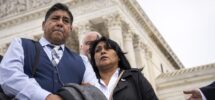U.K. Prime Minister Boris Johnson, in a Wednesday op-ed in the South China Morning Post, said the U.K. will expand immigration rights for roughly 2.9 million Hong Kong residents if Beijing proceeds with its controversial national security law in Hong Kong.
Johnson said the security law lies “in direct conflict” with Beijing’s obligations under the Sino-British Joint Declaration, the 1984 treaty between China and the U.K. that laid out the terms of Hong Kong’s switch from British to Chinese sovereignty in 1997.
The threat was the most forceful yet by the U.K. in the matter of Hong Kong’s autonomy, guaranteed in the 1984 treaty under the “one country, two systems” policy separating Hong Kong’s economy and administration from mainland China’s. Before Wednesday, the U.K. had been relatively quiet on the matter.
Instead, the U.S. has emerged as a sort of adjudicator of Hong Kong’s relationship with Beijing, with President Donald Trump saying on Friday that his administration would begin to roll back Hong Kong’s trade privileges with the U.S. as “it is no longer autonomous from China” in Washington’s eyes.
U.S. leadership on this front is a product of its own interests. But it also reflects the murky legal nature of the Sino-British Joint Declaration that set the terms of Hong Kong’s autonomy to begin with.
“[T]he really interesting question here is not really legal at all but moral,” said Alex Green, an assistant professor of law at the University of Hong Kong. “Does the U.K. have a moral duty to hold the [People’s Republic of China] to account over this new law as a result of its unusual history with Hong Kong and the existence of the Sino-British Joint Declaration?”
U.S. interests
So far, the U.S. has led the backlash against the Chinese central government’s decision to bypass Hong Kong’s legislature and institute a national security law in the region.
When Beijing announced the measure on May 21, U.S. officials declared their opposition almost immediately. They called it a “death knell” for Hong Kong’s freedoms, introduced a bipartisan bill to sanction Chinese authorities who enforce the law, and released statements condemning it as a “violation” of the Sino-British Joint Declaration. Trump then promised to yank the city’s trade privileges.

The U.S. response is based on its own Hong Kong Policy Act of 1992, which laid out American policy toward post-handover Hong Kong and established a preferential trade status for Hong Kong that depended on its continued autonomy from mainland China. The U.S. evaluates the city’s autonomy by the degree to which “one country, two systems”—the policy laid out in the joint declaration—is upheld.
But the U.S.’s quick reflexes also underscore Washington’s growing anti-China rhetoric that has rare bipartisan backing. The U.S.-China rivalry—swelling in recent years over trade, technology disputes, and human rights—has only worsened because of the coronavirus pandemic, with each country attacking the other over their response to the crisis and the outbreak’s origins.
For better or worse, Washington sees Hong Kong and the city’s special trade status as a means by which it can retaliate against Beijing for its treatment of the city and for other, separate grievances. If the White House makes good on its promise to scrap Hong Kong’s privileges, the city’s standing as an international business and finance center could be in jeopardy.
“[Businesses] are going to be very concerned in terms of managing risk, and the political risk now is certainly ramping up in Hong Kong,” said Jonathan Kolieb, a senior lecturer at the Graduate School of Business and Law at Australia’s RMIT University who specializes in international law. “If you revoke the special status, all of the sudden tariffs, trade agreements, and customs duties will all have to be altered, and as America goes so too do several other countries.”
Uncertain recourse
At a protest in a Hong Kong shopping mall on Monday, one demonstrator held her British passport up in the air, while another waved the Union Jack-adorned colonial flag.
Callbacks to the British colonial era are a fringe element of the Hong Kong protests, but they point to simmering sentiment that Britain should take action since Beijing’s commitment to the joint declaration is in doubt. But the declaration itself doesn’t clearly say how that might play out.
The declaration detailed the arrangements of “one country, two systems” and the legal system by which the soon-to-be special administrative region of China was to operate. Adherence to the treaty was based on a mutual agreement that is legally binding, but the deal does not prescribe any specific recourse if the terms are violated.
“[A] breach of the Joint Declaration would constitute a breach of the U.K.’s rights under that document,” Green said, and “it would be up to the U.K. to determine what action, if any, should be taken in response.”
Chinese officials have, at times, seen things quite differently. They’ve gone as far as to argue that the declaration itself is invalid, a claim they reiterated on Thursday.
The declaration was “an important instrument” for “the transitional period” of Hong Kong passing from British to Chinese sovereignty, China’s foreign ministry said this week. “No single article in it grants the U.K. the right to interfere in Hong Kong affairs after its return. The U.K. has no sovereignty, jurisdiction or right of ‘supervision’ over Hong Kong after the latter returned to China,” the statement said.
Seven former U.K. foreign secretaries, meanwhile, called Beijing’s national security law a “flagrant breach” of the declaration in a letter this week that urged Britain to lead the global response to Beijing. In his op-ed, Johnson said he hoped Beijing would refrain from “casting doubt over the Joint Declaration.”
There is “a lot of uncertainty,” Kolieb said, in the area of international law called state responsibility—the laws that determine when an international obligation has been breached and what the consequences should be. “A lot of this stuff is not written down either, a lot of this stuff is interpretation of treaties.”
All legally binding international treaties must be registered with the UN. Registration, however, does not give the UN power to enforce any aspects of the treaty, intervene if one country violates the terms of the treaty, or determine whether the treaty has been violated. “There’s no sort of higher authority that can go and lock someone up or punish someone,” Kolieb said.
UN registration does mean that if a dispute arose, either the U.K. or China could bring it up with “any relevant organ of the UN,” Green said, like the International Court of Justice.
“In theory the U.K. could take China to the International Court of Justice to mediate the dispute…but China can, as other countries have in the past, reject the jurisdiction of that court,” Kolieb said.
Besides, Kolieb added, it’s unlikely: “Usually the great powers of the world tend not to resort to the International Court of Justice to air their dirty laundry and solve their disputes.”
The U.K. could raise the issue with the UN Security Council, as Johnson said he did in the Wednesday op-ed, but China, a permanent member, could veto any actual resolution put forth to the council.
“International law is…based on consent of sovereign states,” Kolieb said. This means that while the declaration entitles the U.K. to take action against China if it believes the latter has violated the terms of the treaty, it does not obligate the U.K. to do so.
“In terms of the joint declaration, if they choose not to exercise their rights and hold China to it, then it’s their sovereign choice,” Kolieb said.
BNO overture
One lever the U.K. is willing to pull relates to the rights of British National Overseas (BNO) passports, documents created in 1985 to apply specifically to Hong Kong residents born before the handover in 1997. BNO passport holders currently have the right to remain in the U.K. for six months without a visa, but not the right to reside there permanently.
Johnson, in his op-ed, said that if China institutes the national security law, the British government will allow BNO holders to stay in the U.K. for “a renewable period of 12 months” and give them the right to work, which could place them on route to citizenship.
Entertaining that possibility is a marked shift from the U.K.’s past stance on the matter—Johnson himself described it as “one of the biggest changes in our visa system in British history.”
The British government has long been reluctant to convert these passports to full citizenship, in part because—the government has said—it would violate the terms of the handover. “I know what BNO stands for, it stands for Britain says no,” Lord Paddy Ashdown, former leader of the U.K.’s Liberal Democrats party, joked in 2017.
Johnny Patterson, director of the London-based nonprofit, Hong Kong Watch, called the BNO policy shift “a strong diplomatic statement.”
Steve Tsang, a historian of modern China and Hong Kong and the director of the SOAS China Institute at the University of London, said the BNO proposal was “a gesture.”
“In reality it doesn’t amount to very much…but what it does show is that the government is willing to consider options to show the Chinese government that the U.K. will try to do something about [the law],” Tsang said.
Responding to Beijing’s moves in Hong Kong is a “very difficult balancing act” for the U.K., Tsang said. “The reality is that with COVID-19 and the U.K. getting out of the [European Union], economically the U.K. feels very vulnerable, and you really don’t want to be antagonizing any potential friends who could be economically helpful.”
Chris Patten, the last colonial governor of Hong Kong, told the Times last week that the U.K. has a moral duty to oppose the national security law, and hit back at the idea of a political and economic trade-off.
“We keep on kidding ourselves that unless we do everything that China wants we will somehow miss out on great trading opportunities. It’s drivel.” Patten said. “The British government should make it clear that what we are seeing is a complete destruction of the joint declaration.”
More must-read international coverage from Fortune:
- 4 more years of Trump may accelerate China’s rise, says former UN Security Council president
- “Nuclear option”: How the U.S. could leverage Hong Kong to hurt Beijing
- London’s Savile Row exported bespoke British suits to the 1%. Can it survive in a socially distanced world?
- To recover from COVID-19, Europe wants more 5G
- WATCH: The global crisis in recycling
- Subscribe to Fortune’s Eastworld newsletter for expert insight on what’s dominating business in Asia.


